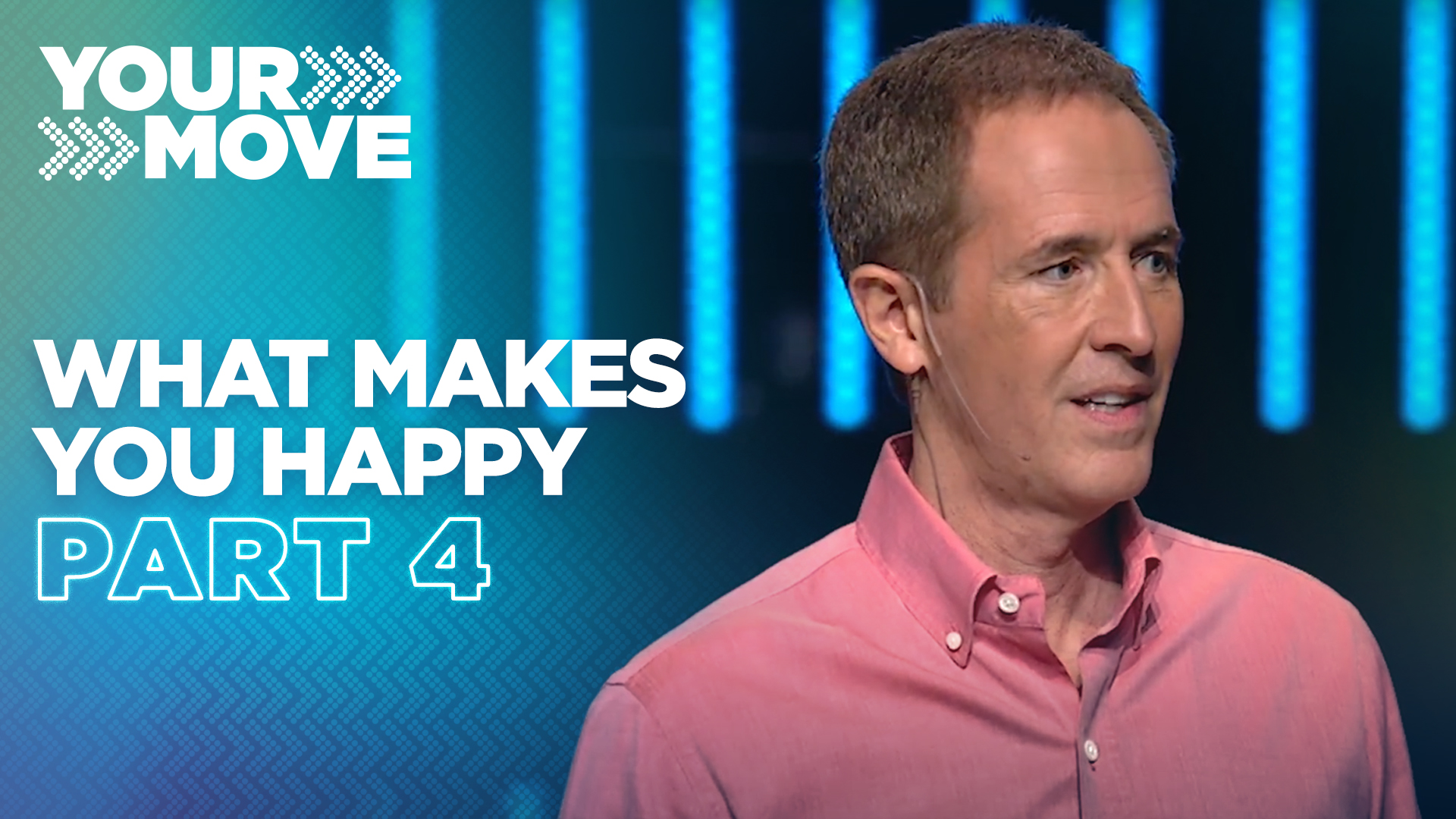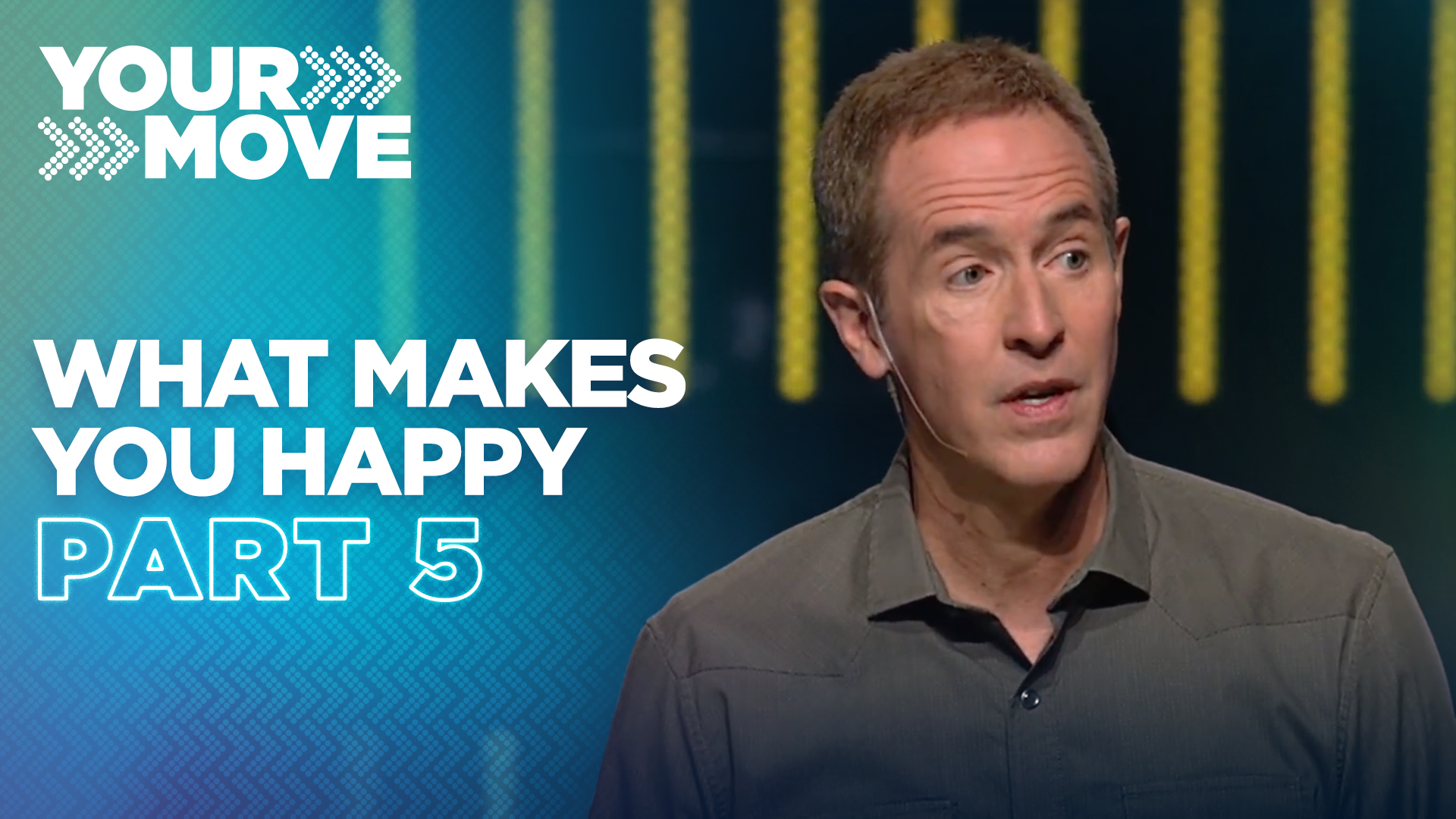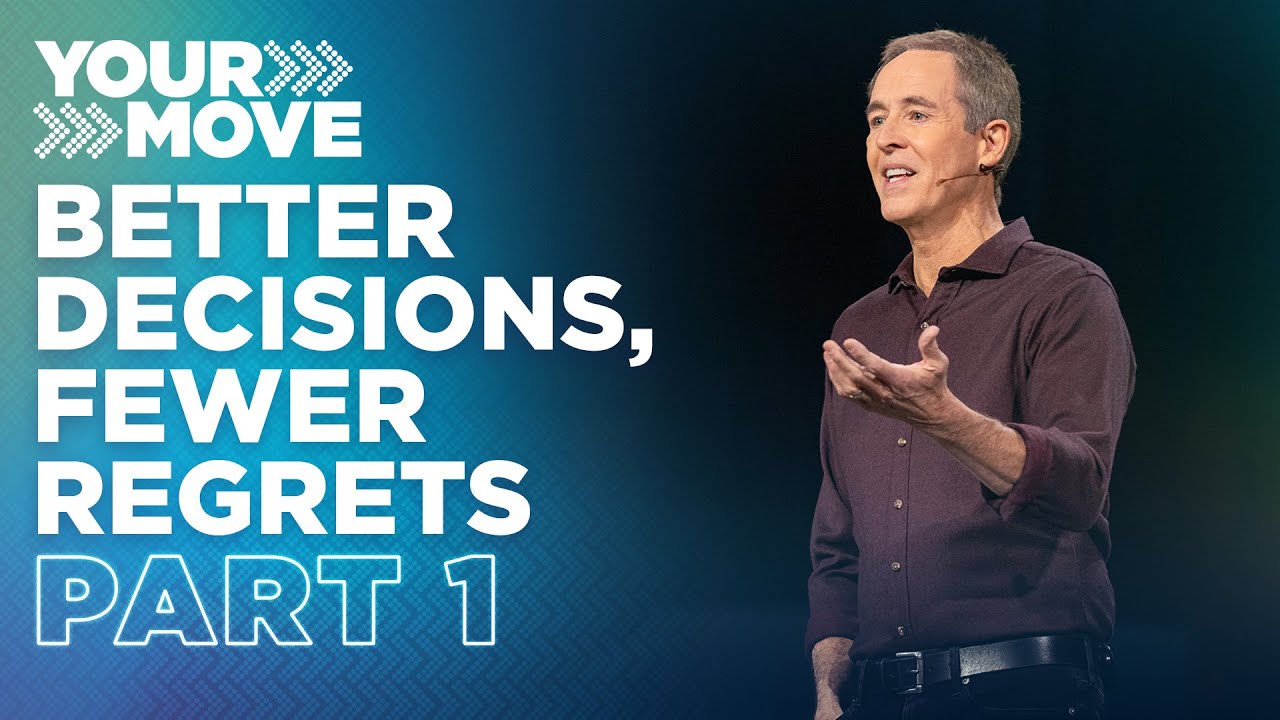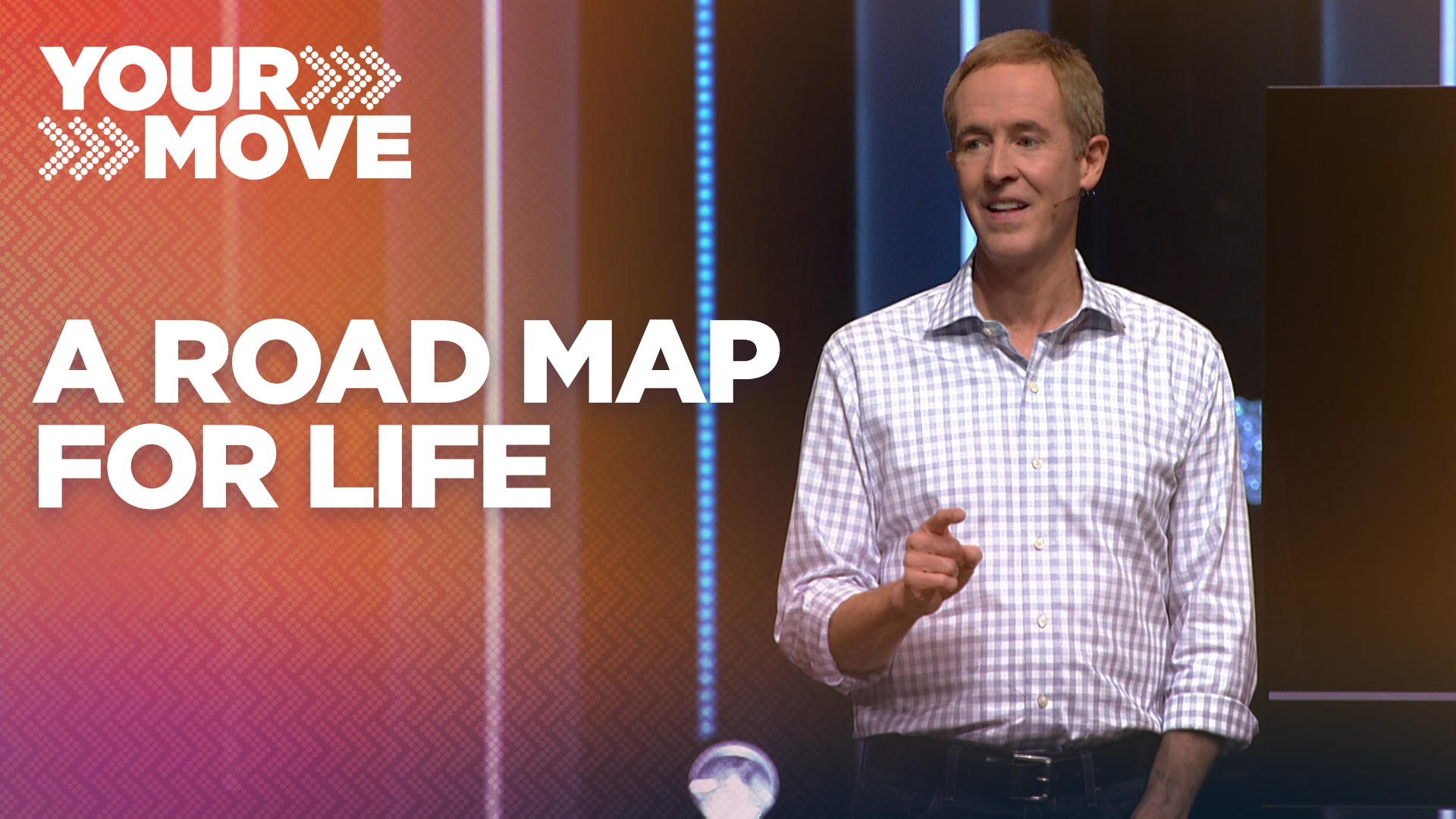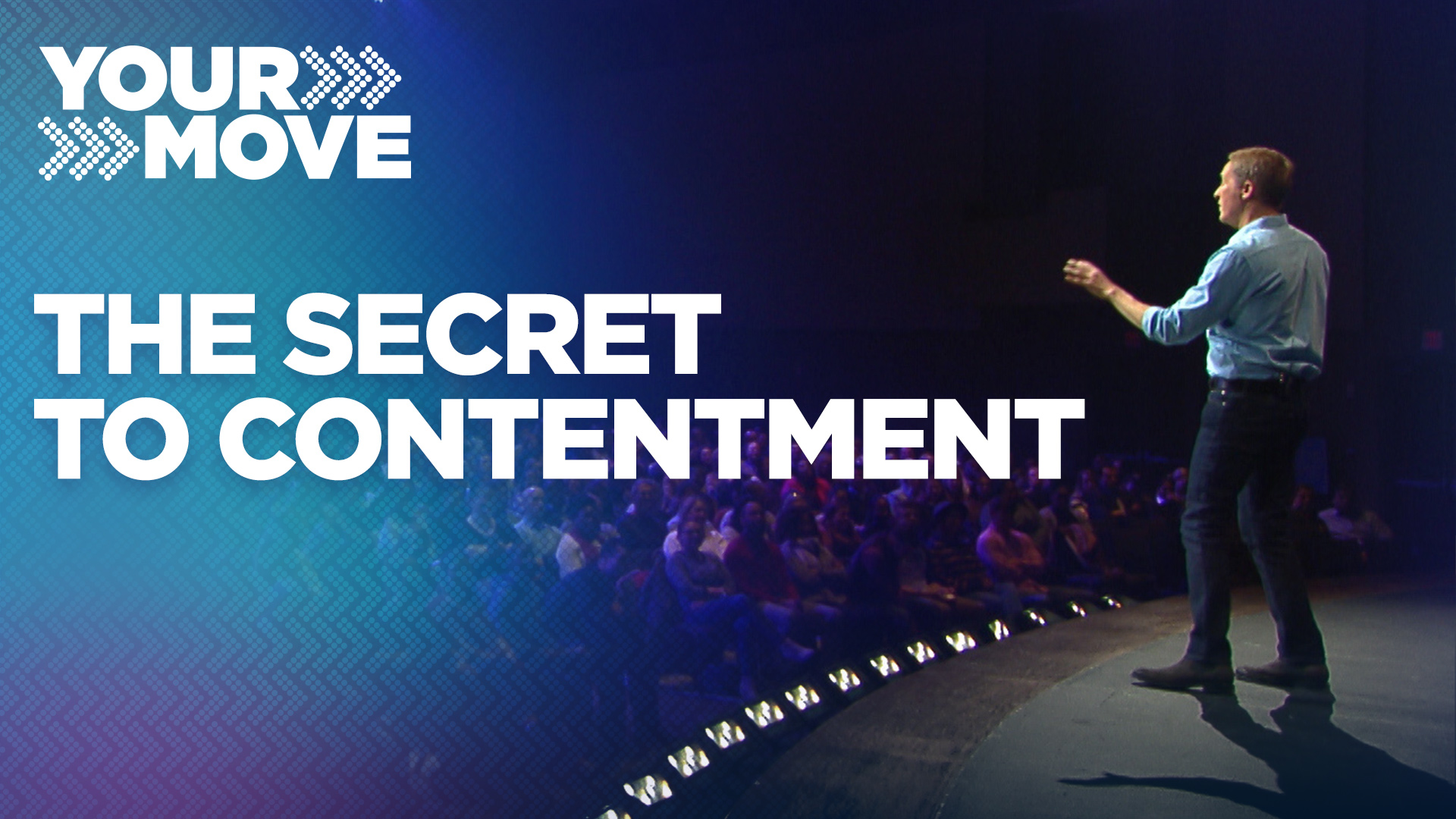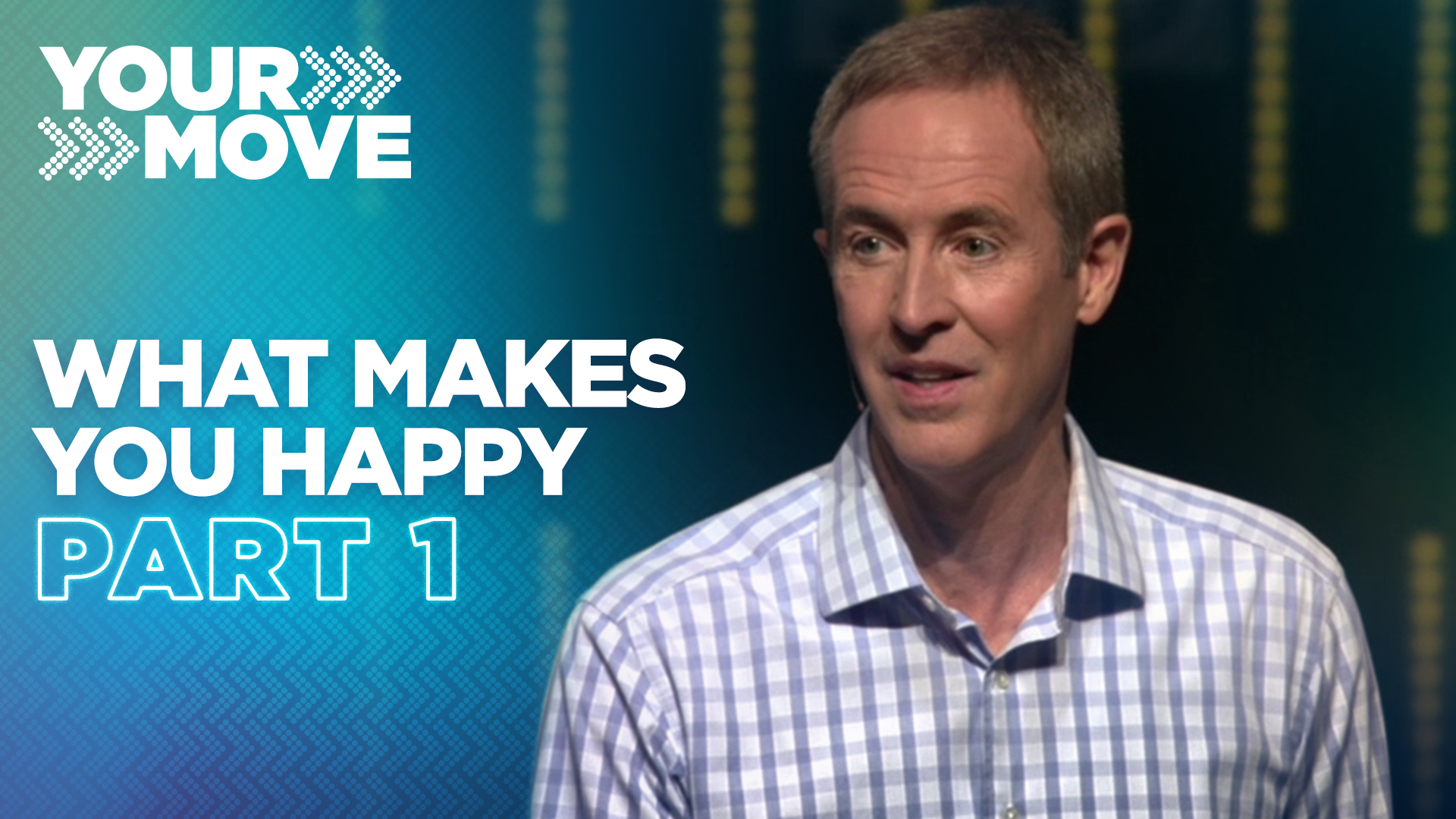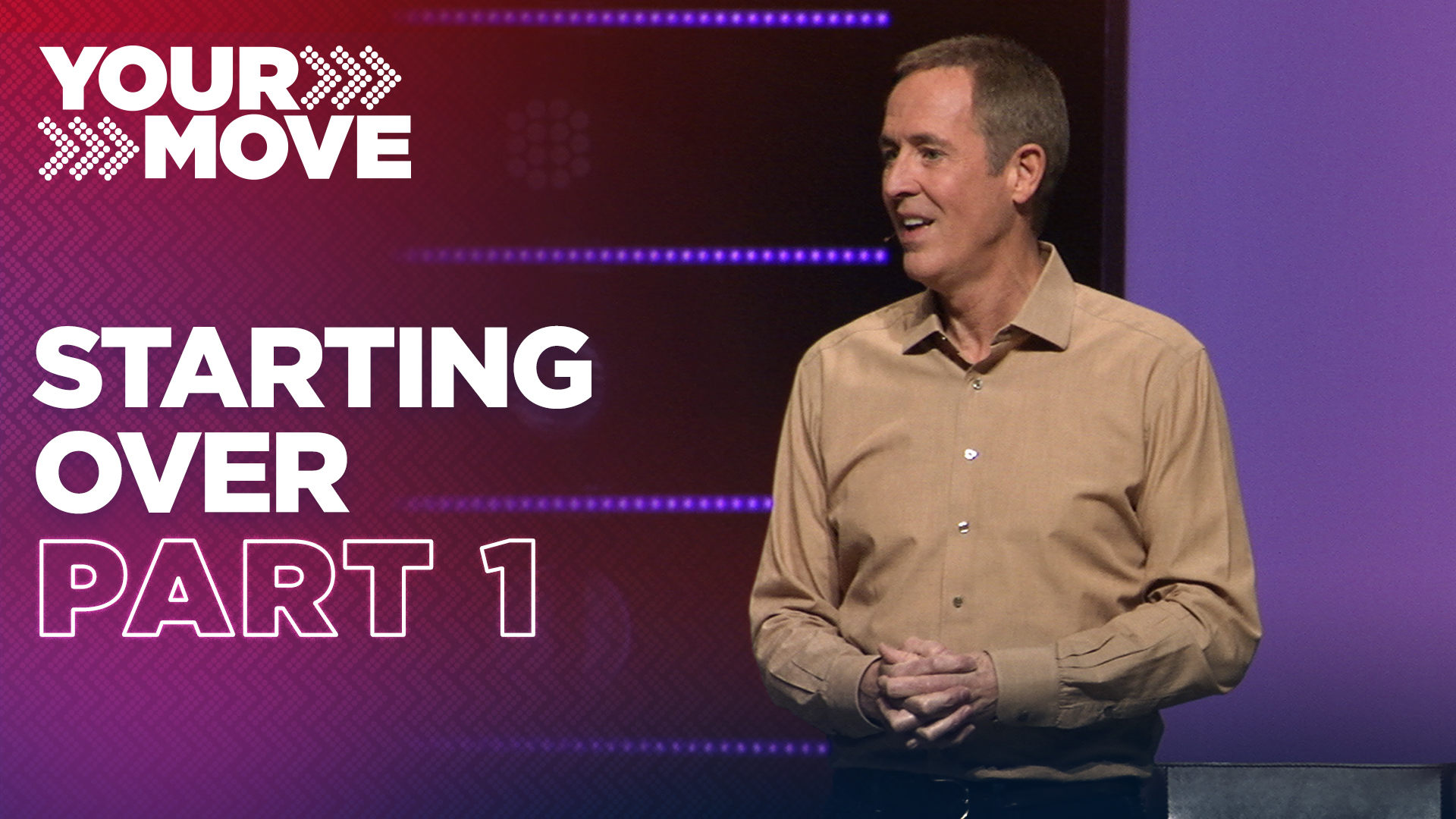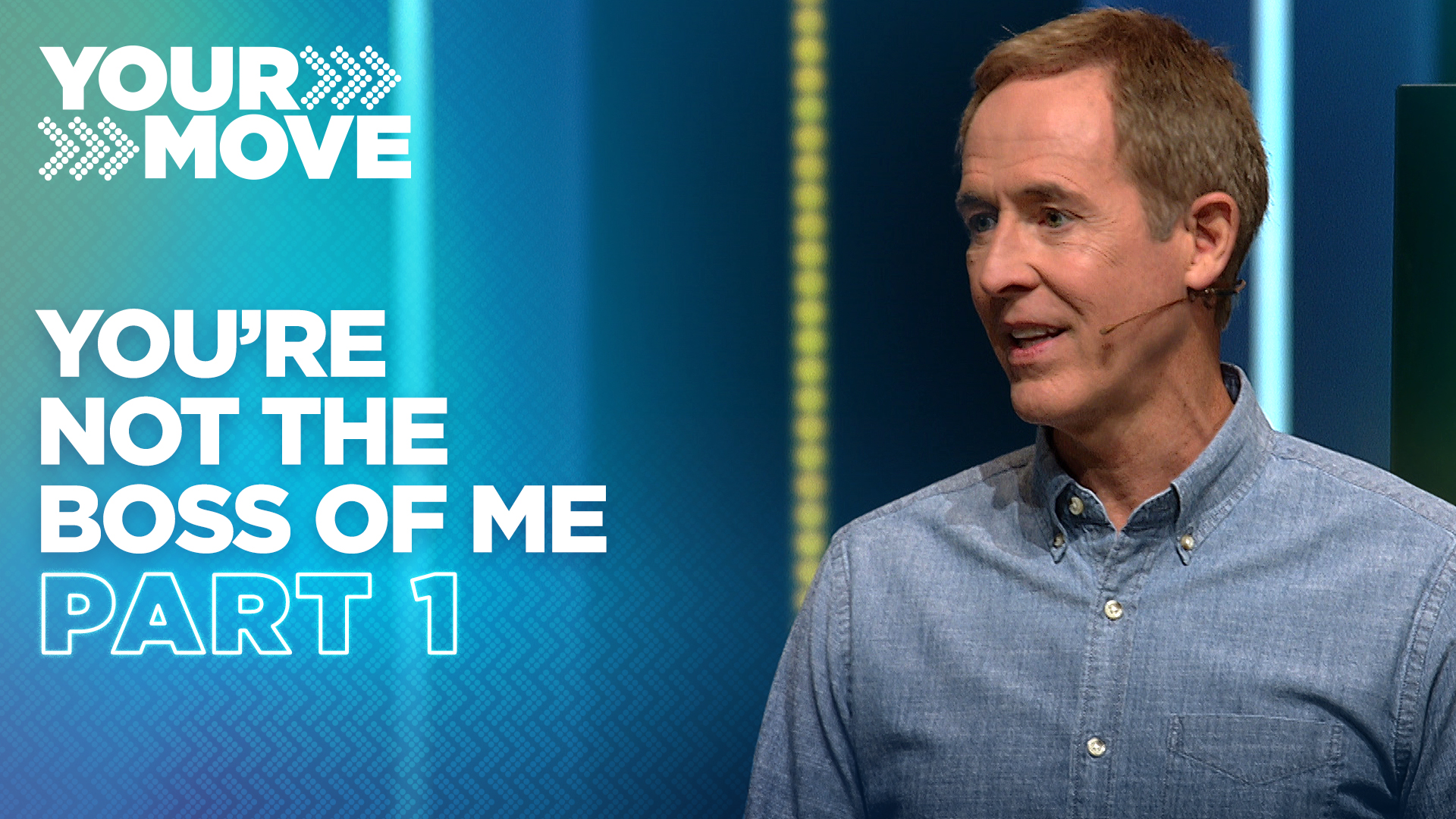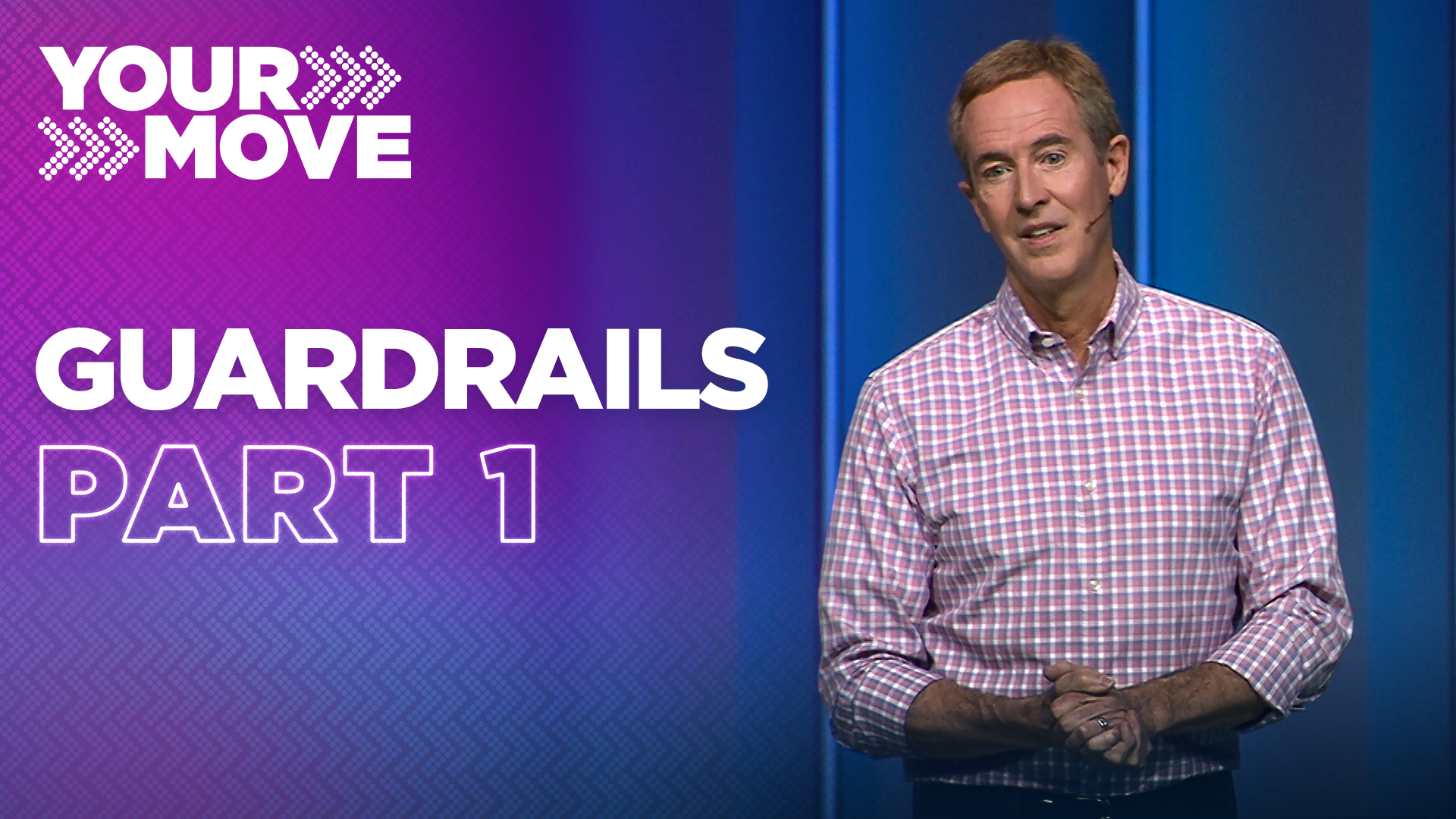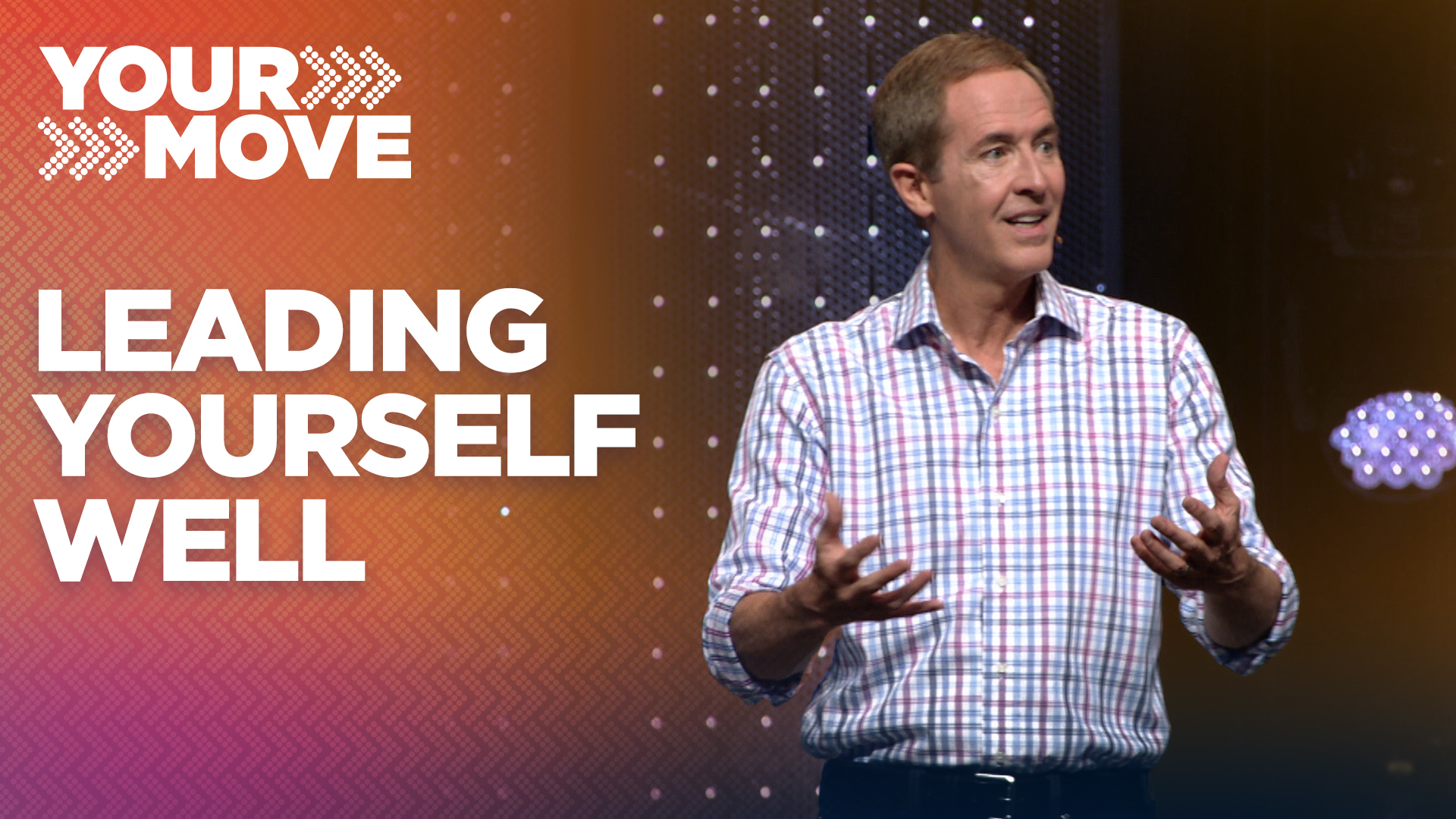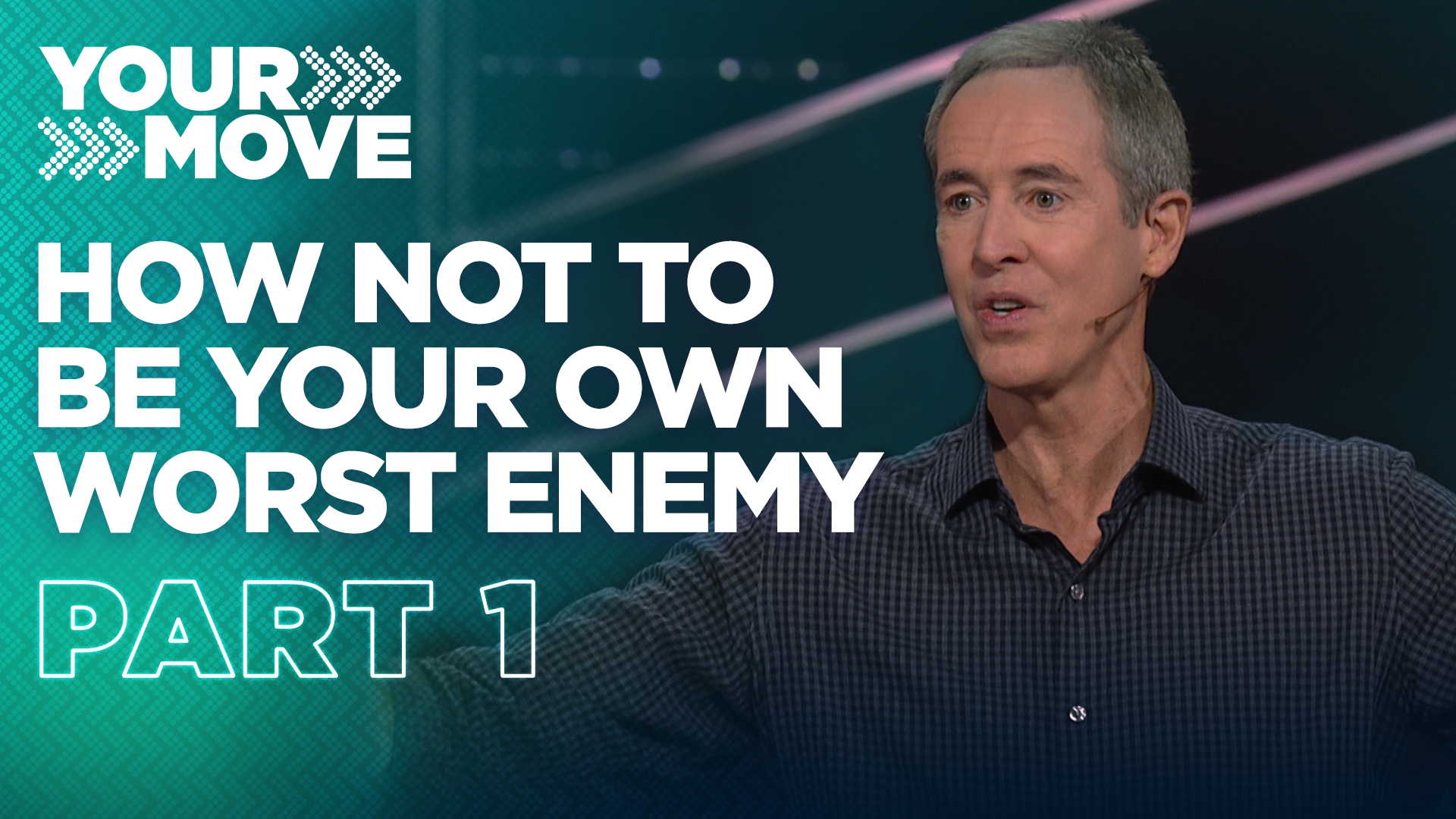If your goal is happiness, no amount of money alone will ever be enough. In this episode, Andy explains how the way you view money can actually help you find peace.
1. Have you ever met someone who was happy despite having little money? If so, what stood out about that person?
2. During the message, Andy said, “Giving will bring you joy, saving will bring you peace, and living on the rest will bring you freedom.” Is it difficult for you to believe that?
Why or why not?
3. Read Matthew 7:24–26. To what extent have you built your life on dependence upon God? How do you think that has affected your happiness?
NOTE: The following content is a raw transcript and has not been edited for grammar, punctuation, or word usage.
I want us to begin the way we begun the last few weeks, and if you’re here for the first time I’m going to give you a quiz, and you don’t know the answers and that’s okay because you haven’t studied, but for those of you who’ve been watching for the past few weeks and those of you who’ve been here, I want to hear you answer these questions loud and proud. We’ll say these together. So, first question is this: What makes you happy?
No thing.
That’s right, no thing makes you happy, because happiness is more about a who than a what and so no thing makes you happy, right? If you’re happy it always involves a who or two. Second question, same question second answer: What makes you happy?
Sowing.
Yeah, sowing. Happiness we’ve discovered is an outcome. Happiness is a result. Happiness, and this is the tricky part. That means that happiness is not immediately accessible. If you are an unhappy person, no single message or no podcast, or no Ted Talk is gonna make you happy. Happiness is a process. You sow your way into happiness. But the problem, the problem with sowing and reaping, is that it takes time. The problem with the law of the harvest is you plant a seed today and there is no crop tomorrow, in fact there’s no crop a week later. There may not even be a crop a month later, right?
The problem with sowing and reaping is, as you begin to sow, if you don’t know which direction you’re sowing in, you could be sowing in the direction of your own unhappiness, and then one day you’re 30-years-old, and you’re like, “Oh my gosh, I’m so unhappy,” and you look back and you think, “Well no wonder I’m unhappy, look what I’ve been doing for the last 10 years of my life.
But many of you, many of you, you’ve been sowing in the right direction, and the reason that you’re happy isn’t just because you were born happy, and the reason you’re happy, you know this, isn’t because your circumstances are so much better than everybody else’s circumstances, in fact, in some cases your circumstances are far worse than many people’s circumstances, but you’re still happy because you’ve understood some of the things we talked about, perhaps you were raised in a church that taught these very same things. But you sow your way into happiness, you’ve got to sow for it. And there’s no other area where that this applies more than in the area of money, because in the area of money, like so many things, we’ve had this thought, “I thought I knew what would make me happy. I thought I knew what would make me happy.”
Do not believe everything you think because you have made decisions based on, “I thought this would… I thought that would make me happy.” And you were absolutely wrong.
Now, nowhere, nowhere, nowhere, nowhere, does this become more important, in the area or in the realm of money, because, we believe, we all believe that there’s a connection between our money and our happiness, and whenever you hear someone say, or especially preachers, “Money won’t make you happy, money won’t make you happy,” you sort of go, “Yeah, that’s right,” but none of us believe that. I don’t believe that, you don’t believe that. I don’t care how many times you hear it, “Money won’t make you happy, money won’t make you happy,” and we always think, “Well just try me.”
If that’s a test I’d like to take that. Where do I sign up to find out if money will make me happy? ‘Cause I think money would make me happy, and I know on the surface, and I know you need a who or too but at the end of the day, the bottom line is, I believe money will make me happy.”
Now, here’s why, and what we’re going to find out today is that there is a connection, there is a connection between happiness and money. There is a connection between happiness and money. The conclusion today isn’t ‘money won’t make you happy’, I don’t believe that. There is a connection between happiness and money. But where we mess up and where we get this wrong, and even if you’re not a religious person, we assume that the connection between money and happiness is this word right here, ‘more’. “If I had more money I would be more happy. If I had more money I would be happier.”
Here’s a question, here’s a question for you: How much more money would it take to make you, I’m gonna add a word, more happy? How much… Just think for a second. How much money? How much more money would it take to make you happy? How much money? In other words, if more money means more happy, how much more money? You should know that. How much more money would make you more happy? Now, in this series we’ve said something really important that I think most of us agree with, that happy people, they have this thing that all happy people have, all happy people have peace. All happy people have peace. When you meet a happy person, they’re at peace with themselves, they’re just at peace with other people, they’re at peace with the world, and many times you’ll find they’re at peace with God.
So let me ask this question a little bit in a different way using our word ‘peace’, okay? How much money would it take to give you peace? How much money would it take for you to have peace? “My kids are a mess, but I got a raise. My marriage is, but… ” How much more money would you need to have peace? And I know the answer to this question, for every single person in this room, those of you who don’t have much, those of you who have middle, those of you who have a lot and those of you that we go, “Really? How did you make that much money?” The answer for all of us is the same, and the answer is this, “more than you currently have.”
[laughter]
Okay? Now, this is so important. No matter… Because if you’re in your 20s and your 30s, you do not believe this, and if you’re in your 40s and your 50s, you wish you had believed this in your 20s and 30s. No matter how much money you have, and no matter where you are in life, and no matter what you drive or what you wear and where you live, for the rest of your life, you will always answer this question the same, “How much more money do I need in order to have peace? How much more money do I need in order to be happy?” “More than I currently have.”
Now here’s the thing, and here’s why I’m so glad you’re here today and watching. Okay listen. There is a corollary, there is a corollary between your money and your happiness. There is a corollary between your money and your happiness, but it’s not more. Because you know people with a lot more money than you that are not happy, and you know people with a whole lot more money than those people have money and they’re still not happy; and you know people with a lot less money than you, and they’re happy. You know families, they just get along, they love each other, they love to be together, and your family makes twice as much money and nobody wants to come home, and nobody even wants to go on vacation with you.
Your kids want to go with your friends on vacation and they’re not going to near as cool a places as you’re going. And you’re thinking, “But we have a pool, and they still don’t wanna come to our house.
Now there is a corollary between money and happiness, but it really isn’t more. And my only frustration with this whole message is at the end of this message, I think we’re probably all gonna agree with the premise, and we’re probably all gonna agree with the big idea. The question is and the challenge is, how do we get this, “Andy, you’re right. Yeah, I kinda knew that before I came in here and it makes sense.” How do we get that from our heads to our hearts? Because if you ever did, your perspective on money would be so different and your perspective on happiness would be as well, and you would find a way, you would discover the way to sow financially to your own happiness.
And what’s most important and for those of you who are parents, you would begin then modeling for your kids how to connect money and happiness, but they don’t connect around the word ‘more’. They connect around another M-word, the word ‘managed’. It is not how much you have but how you manage what you have that determines whether or not you’re gonna be happy when it comes to money. It is not how much you have, it is how you manage what you have that will determine whether you are not… You’re gonna be happy when it comes to your money. It’s not the amount of, it is the management of; in other words, money can contribute to your happiness if you manage it well.
Now, follow me, okay, and we’re gonna look at something Jesus said in just a second. Now think about what was said earlier. “Anything… Think about this. Anything that undermines your peace, undermines your happiness… ” That’s what we’ve said throughout this series, think about that. “Anything that undermines or undercuts your road, your peace, anything that undermines your peace, undermines your happiness,” which means, if you mismanage your money you undermine your peace. If you mismanage your money, you actually undermine your peace, regardless of how much money you have or how much money you earn. In fact, Jesus says something that’s so staggering, and we’re gonna spend a few minutes looking at it because if this is true we should all kinda hit the reset button when it comes to our money. Jesus actually says, that if you don’t get in control of your finances, if you don’t learn how to manage your money well, your money… And this is where many Americans are, this is where many of you are, if you don’t figure out how to manage your money correctly, your money will manage you, and if your money and your finances are managing you, you do not have peace, and the reason you don’t have peace is because you feel out of control, and in any arena of life where you feel out of control, you feel anxiety, and when you feel anxiety, it’s hard to be happy.
Now this is amazing, and if you grow up in church you’ve heard these words before that Jesus said… They’re so rich, they’re so deep, I wanna show you the whole passage and go back and look at a couple of words, but here’s what Jesus said, this is a surprise when you… He sets this up and you think you know where he’s going and then suddenly he goes in a different direction, because Jesus was the master teacher and that’s what he would do, but listen to what he said, he said this: He said, “No one… ” You probably heard this before, “No one can serve two masters to which we think… ” “Well it doesn’t even matter ’cause I don’t have a master, okay? I don’t live in that world, I’m not in the first century. We don’t do that anymore. I don’t have a master; I do whatever I want, when I want, with whomever I want,” until you have to pay your property taxes and you’re like, “Oh yeah, well there is that.”
Okay? So, “No one can serve two masters, either you will hate the one and love the other… ” And he speaks in such extremes, I mean Jesus, really, isn’t there any middle ground? “You will either hate the one and love the other, or you will be devoted to one and despise the other.” To which we say, “Okay, I’m following you.” And then Jesus talks about these two masters. And this is the surprise, this is when everybody who was taking notes looked up, and everybody who was listening to Jesus went, “What?” Listen to his application of this idea, “You can only serve one master. You cannot serve both God and money.”
And the interesting thing is, the Greek word that’s translated money here, this isn’t a great translation, it’s close. In fact, in older translations you might have seen the word ‘mammon’ and we’re like, “What’s a mammon?”
Basically, this word means ‘stuff’. It includes money, but it’s broader than money. It’s all the stuff; it’s the stuff you want, the stuff you have, and the money you have to buy the stuff that you haven’t purchased yet, it’s just all your stuff. And Jesus says, “You have to serve one of two masters, and you’ll either serve God, or you will serve your stuff,” which means in Jesus’ way of thinking, and you might not agree with this, but in Jesus’ way of thinking… You should consider it, he’s Jesus, okay? In Jesus’ way of thinking, the chief competitor… This is so powerful. The chief competitor for your devotion; in other words, God wants your devotion and there’s something else or someone else that wants your devotion. God wants to call the shots. There’s something, there’s someone else who wants to call the shots in your life.
Now, you hear that and you kinda hear this sort of hyperbole, this big language, masters and serve and all that, and you think what I think, you think, “Okay, I kinda get that, but honestly, I don’t serve my stuff, and I don’t love money.” And Jesus says, “Hang on there. Look carefully at what I said.” And this is why I wanna look at these two words, this is so powerful.
In fact, again, if you’re not a Christian, if you’re not a Jesus follower, if this is all new to you, you should read what Jesus said, you should read what Jesus said, you should read what Jesus said, because I’m telling you, it will make you better at life and it will make your life better and if you come to the conclusion that he’s the Son of God, we think that’s awesome. But you should read what Jesus says, because listen to the richness and the depth of this insight, because we say, “Oh, I don’t love money. I don’t serve money, money’s not my master.” And Jesus says, “Oh, you might have read that too quickly.” Look at what he said, look at this: “No one can serve two masters, either you will hate the one and love the other… ” “I don’t love stuff.” He says, “Ah, keep going, because I’m going to define exactly what I mean by love. Or you will be devoted to… ” “So Jesus, what do you mean by ‘love stuff and love money’?” “I mean be devoted to.” “What’s devoted to?” “Devoted to is like there’s a real strong attachment to.” Uh-oh, now you’re talking, right?
Because to be devoted to is like there’s a quest for. To be devoted to is I got my eye on. To be devoted to, it becomes the filter, a primary decision-making filter, that when I begin to make decisions, I kinda look through that filter of what I’m most devoted to when I make a decision. And Jesus says, “You may not like the word ‘love’ but let’s be honest, you’re pretty devoted to your stuff, and you’re pretty devoted to your desire for stuff.” And you may not say, “Oh, I bow down and I love money,” but when you take your devotion to money, and when you take your devotion to stuff, and you measure it beside your devotion to any other thing, you may have to conclude, you are at least pretty devoted to stuff or the acquisition of stuff.
So, let me ask you another kinda pesky, meddlesome question: Has your desire, or we can say devotion to, to use Jesus’ term. Has your desire for some thing, ever caused you to do some thing? Has your desire for something ever caused you to do something stupid? Now notice there’s no comma. So I’m not calling you stupid. I’m not saying, “Has this ever caused you to do something, stupid?” Okay, I just want to make clear, okay? But the question is, “Has your desire for something ever caused you to do something stupid?” And the answer for all of us is what? Oh come on, the answer for all us is what?
Yes.
Yes, you all have done impulse buys. You bought stuff you didn’t need. You’re in debt over things you don’t even have anymore. You bought stuff and like, “Why did I do that?”
Now let me ask you in a different way: Has your desire for something ever caused you to do something you regret? Yes. So think about this for a minute. What is that? That’s a desire for, that equates to a devotion to. Here’s the thing, your devotion to your desire for stuff, your devotion to your desire for getting what you want, your devotion to your desire to spend in order to satisfy some appetite that’s never, ever, ever, ever satisfied. Your devotion for your desire for, your devotion to your desire for… In those moments, mastered you.
You were not the boss, and now you got that crazy lease payment you wish you didn’t have, and now you got a boat sitting in a driveway or in storage somewhere, or some RV somewhere. It’s like, “We used it four times and then we got busy, and why did I buy that crazy thing? Why didn’t we just re-cover the couch? Why didn’t we stay in that smaller house? We didn’t even need all that space? Why is my closet so full? Why do I have to keep have to keep giving stuff away so I can put more stuff in? Why do I stand in front of a full closet and think to myself I have nothing to…
Wear.
Why do we do that? So real quickly I wanna explain why, then I wanna give you a real specific application as it relates to happiness. You know how this begins? This begins with this word right here, ‘discontentment’, discontentment. This is a powerful, powerful thing. Discontentment ensures, discontentment ensures that I’m never satisfied with what I have because I know what you have and I know what there is to have. Discontentment ensures that I am never satisfied with what I have because I know what you have and I know what there is to have. The thing that drives discontentment is this word right here: Awareness. Awareness, awareness. As you become aware of what there is to have you become discontent. As you become aware that they’ve upgraded and there’s a newer one and a shinier one, you become discontent.
As you become aware of what everybody else has, you become discontent. You can’t even remember all the times you have walked through a mall or a big-box retailer and you thought, “Oh I didn’t even know there was such a thing!” And suddenly you needed it. And it took you about 30 seconds to go from “didn’t know it existed” to “I need it.”
And you checked out with it. What is that? I’m telling you, discontentment is a powerful thing, and the thing that drives it is awareness.
Now, the thing that… The part of what drives discontent, our first word is the second word, this word right here: Greed. Now, none of you are greedy. You cannot see greed in the mirror. Most of you are greedy, but you’ll never see it in the mirror. Greed is that other person. But let me give you Jesus’ definition of greed, and I don’t have time to take you to the passage we’ll do that some other time, but here’s what Jesus said greed is: Jesus said that greed… Greed is simply the assumption that it’s all for my consumption, that’s what greed is. Greed is, if it gets placed in my hands it’s for me. And I may choose to give a little bit to you, but aren’t I a nice person and aren’t I a generous person, because I don’t have to give you any, because if it gets placed in my hands it is for me. If you live with the assumption that everything that comes your way is for your consumption, by Jesus’ definition, you are a greedy person. And if… And here’s the thing, if everything that comes to you, think about this, if everything that comes to you is for you, you’re gonna use it on you.
But here’s the problem, greed is an appetite. The desire for stuff, the devotion to stuff is an appetite. An appetite, as we’ve said 1,000 times here, are never fully and finally satisfied. So if you’re driven by discontentment, aware, aware, aware, and then you’d live with the assumption that everything that comes your way is for your consumption, you are gonna spend everything that comes your way on you but you’re not gonna stop, because you’re an American, you’re Canadian, you’re European. We don’t stop when the money runs out, that is so 17th century, that’s so 18th century, right? We don’t have to stop when the money runs out, and that leads us to our third happy word: ‘Debt.’ Right?
Now listen real carefully, I gotta go fast, ready? ‘I want’ is better than ‘I owe’. Let’s just say that together, that’s a really big idea. Ready? I want is better than I owe.
When you want something and don’t have it, there’s tension. When you owe something and don’t wanna have to pay on it there’s tension. We’ve all lived long enough to know which the better tension, which tension we’d rather live with. It is better to live with, “I want and don’t have,” than the “I owe and can’t pay for it.” So you’re gonna be in one camp or the other because your always gonna want stuff. But debt is when you become a slave, you become a slave to your desire. Your devotion to your desire leads you to slavery, and you are not a happy person when you owe on things that you wish you’d never purchase to begin with or you can’t make your payments. And here’s the other problem with debt, okay? I owe… I owe is between… This is important. I want, is between you and God, I want is between you and God. “God, I really want it,” and God’s convicting you and dinging your conscience And you kind of hear God going, “Hey, can’t have it, can’t afford it? Don’t do it. It’s stupid, you’ll regret it.”
That’s between you and God, but here’s the trick: Once you buy it and once you borrow to buy, now here’s the thing, now it’s not between you and God anymore, it’s between you and a creditor, and here’s the worst part, God sides with the creditor, because if you’re a Jesus follower you have to pay what you owe, you have to pay your debts. And suddenly, the God who’s trying to talk you out of it to begin with, is standing behind the creditor and saying, “Pay up, I’m on his side, I’m on her side.” You’re like, “Wait a minute, you switch sides.” And God says, “No you just made a stupid decision. I warned you.” So, ‘I want’, is better than ‘I owe’.
And here’s the crazy thing, you know this: The more money you make, the more tempting it is to go into debt. Go explain that to someone in the third-world country, try to explain that to your grandparents, right? The more money you make the more opportunities you have to borrow more money to do the… I mean it’s just crazy. So every single day, just about, I’ll look at my goals, “Stay out of debt,” and here’s why: Because I don’t want me and my family, and I don’t want you and your family, to trade your peace for some thing that can’t possibly bring you peace.
So, I’m gonna put all three words up here and I’m gonna ask you couple of questions then we’re done. Look at these words: ‘Discontent’, ‘Greed’, ‘Debt’. Okay, which one of these makes you happy?
[laughter]
Discontent is like, “You know what? I get to the mail box and I pull out all those catalogues, I can’t wait for Christmas. There’s like 85 catalogues everyday, and I spread ’em out, and I look at all that stuff I don’t have and I’m like, “Oh… So fulfilled.”
Discontentment doesn’t… And listen, discontentment erodes your happiness. Okay, what about greed? Does it make you happy? I just consume, consume, consume. I like to consume right up to the limit. I just… I just, it’s all for me. I’m just so happy when I’m just, consume, consume, consume. We’re gonna talk about that in a few weeks. No, debt, the more I owe the happier I am.
Listen, “None of this ever makes you happy!” So here’s the application: Stop! Just stop! Just don’t do this anymore. If you wanna know how to connect your money and your happiness, you do away with these three things and you’re just gonna be happier. Now let me ask you this way: What amount of money, think about it, this is why the whole ‘more thing’ doesn’t matter. It’s not the amount of, it’s the management that matters. It’s not the amount of it, it’s the management of. Think about this: What amount of money, what amount of money would it take to eliminate discontentment? There is no amount of money that would eliminate discontentment. You will be discontent no matter how much money… How about this? How much money would it take to do away with your greed? There is no amount of money, an amount will not address this.
The only thing that addresses these three things, is management, it’s how you manage your money. It’s who is control, it’s who is the boss. And Jesus says, this is what’s amazing, Jesus says, “No one, no one, no one can serve but one master.” And he offers us an alternative. He offers us an alternative, he says, “No one can serve two masters, you cannot serve both God and money,” which means, There is a way to submit your financial life and your financial world to God, and just say, “God, I don’t want my stuff and my money to manage me, I want you to manage me and teach me how to manage my money.” And Jesus suggests, “You can have a new master, and his last name is not ‘card’, okay?
And now here’s the thing, here’s the thing: I know, somebody got that, I thought it was kind of cute. It’s cute in my notes, maybe not in the sermon. Okay, look over here one second. Okay, here’s the thing. If you take, and we’re not… We could spend weeks on this, if you take everything that Jesus taught about money, and you took everything that the scriptures that He read said about money, which is the Jewish scriptures. If you take everything that Jesus says about money and everything that Old Testament scriptures say about money, you could condense it all down to two words, and these two words right here: ‘Generosity’ and ‘wisdom’, generosity and wisdom. You go meet the happiest person you know and talk to them about money, guess what you’re gonna discover; they’re generous and they’re wise with their money, they’re happy. When you can trash generosity and wisdom with discontentment, greed and debt, I mean is there any competition at all?
If you wanna connect the dots between happiness and money, this is the way to go. Now, in our world, we have a little saying around here that we come back to over and over and over as it relates to finances, that takes what the scripture teaches about generosity and what the scripture teach about wisdom, and we put it all together into something that’s so easy to memorize. In fact, this is the game changer. If you begin to restructure your world around these three simple ideas, and here they are, real quick: It’s give, save, live. Give, save, live. That is every time you get money, you say to your money, “You are not my master. I’ll prove it to you, I’m gonna give some of you away. See there, take that.” You give first, you save second, and you live on the rest. You give first, not when you’re asked to give, as soon as money… So you’re not gonna wait for a fundraiser. Money comes your way, you say, “Money, I wanna just let you know, God’s my boss and I’m your boss. God says give, so just to prove that you’re not in charge, I’m giving some of you away, gone.”
Give first, save second, live on the rest. Here’s the thing: Giving always, always, always results in joy. Giving… You know this, giving always, always, always results in joy. Discontentment, no joy. Greed, no joy. Debt, no joy. Giving always results in joy. Saving, this is so cool, saving, listen: Money in the bank leads to peace in the mind, Money in the bank leads to peace in the mind… Or peace of mind. Let’s just say that together.
Money in the bank leads to peace in the mind.
That’s right. So saving results in peace. Debt doesn’t result in peace. Discontent doesn’t result in peace, and greed certainly isn’t gonna bring you peace. And when you choose to live on the rest, you’re financially free. You just choose not to spend more than you make. What a concept! Don’t spend more than you make. And if you don’t spend more than make… This is what the Old Testament teaches, this is what the New Testament teaches: If you live on what’s left over, you are financially free, and you drive around like I do, my whole life, I drive around going, “I can buy one of those, but I’m not going to.”
“I can lease one of those, but I’m not going to.”
“I can borrow enough money to live in one of those, but I’m not going to. I could, I could, I could, but I’m not going to, because I would rather be free and I would rather have peace and I would rather have joy, than your house, or a new truck, or a new anything. And look, look up here, to the degree that I can love a group of people I don’t know, I love you and I want you to experience joy, peace, and freedom. And Jesus is inviting you into this. And more money won’t bring this, the way you manage your money will. This is how you make your money make you happy right here. This is how you make your money, make you happy. Now, I’m almost done. Now look, imagine, if you’ve been doing this for the last 20 years, 30 years, 40 years. I don’t have to imagine, I’m so fortunate. I was raised to think like this. I have given first, saved second, lived on the rest since I was in high school. I leased a car one time and I hated my life. I could not wait to get out that stupid lease
But I just hated the idea of owing someone else money. And I’m just telling you, imagine if you’re whole life so far, you had… As soon as any time money came to you, you didn’t wait for a fund raiser, you didn’t wait to see children on the screen, you didn’t wait for some commercial or somebody to tug at your heart strings, I mean, you were generous, money comes in, you give it. You give it, you give it. You save. You take care of God’s kingdom, your kingdom, and live on the rest. Imagine if you’ve been doing that all of your life. You would be hap-pi-er, as it relates to your fi-nan-ces.
So here’s the thing. You know what makes you happy? Sowing. Do you know what would make you happy financially? Sowing in the direction of giving, saving and living on the rest. Giving, saving, living on the rest. Because you’re smart enough to know this: Discontentment doesn’t make you happy, greed doesn’t make you happy and debt doesn’t make you happy. So just stop, sow for it. Beginning next week, beginning next paycheck just, “Boom! You’re gone. I’m in control. God says give, I give money, you don’t manage me anymore. You’re not gonna be my master. I’m not gonna be your slave.” Because at the end of the day it’s not the amount that counts, it’s management that makes all the difference, it’s management that makes all the difference. Money contributes. Money contributes to your happiness, when you and if you manage it well.


